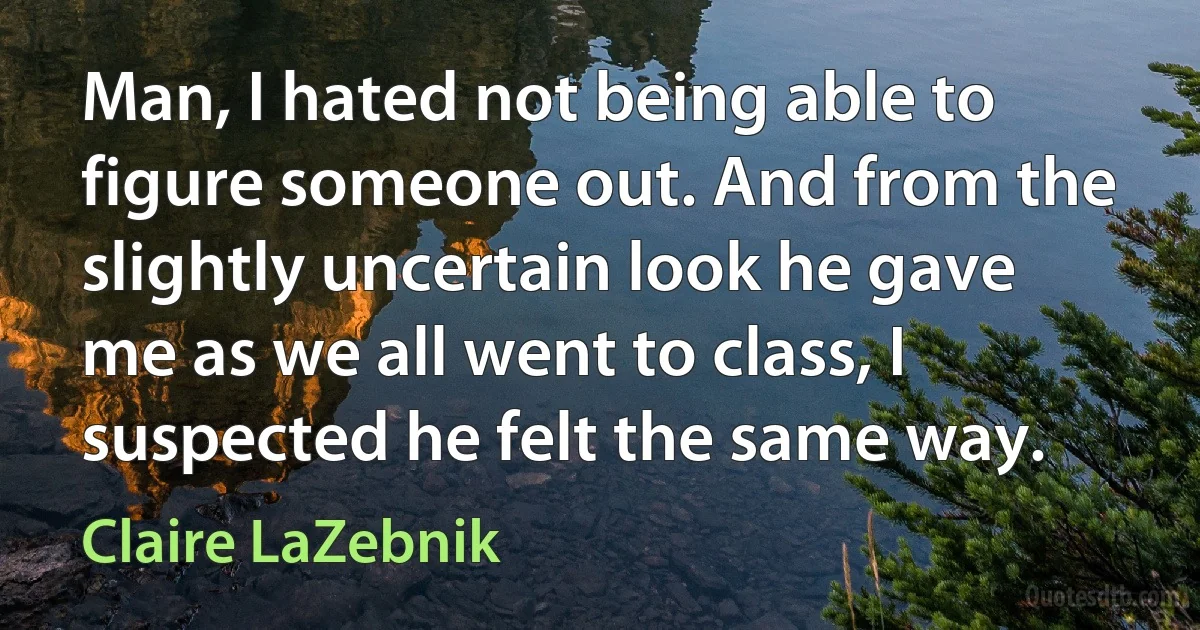Uncertain Quotes - page 9
Positive, healthy, loving relationships in your twenties... I don't know if anyone would disagree with it: I think they're the exception, not the norm. People are either playing house really aggressively because they're scared of what an uncertain time it is, or they're avoiding commitment altogether.

Lena Dunham
She moved slowly, and her coat, too tight, made her belly stick out more prominently. With the two dollars deep in her purse she wandered off, more uncertain than ever, for now she saw the shining pans and pots and the cloth, so soft to the touch. Her desires grew vast and many, and she left, poorer certainly than when she had come in the store.

Gabrielle Roy
To understand society deeply is always to see the settled from the angle of the unsettled. The settled is the region or the moment where relationships become fixed and, through their fixity, take on a specious aura of necessity. The unsettled is the experience that discloses the perilous, uncertain, malleable quality of society. By seeing the settled unsettled or by looking toward the disturbances that take place in its vicinity, we begin to understand how the settled really works and what it really is.

Roberto Mangabeira Unger
Under the new circumstances discontent is universal; all the workers feel depressed under capitalist superiority; fuel for explosions has accumulated everywhere. It is not for others, it is for themselves if they join the fight. As long as they feel isolated, afraid to lose their job, uncertain what the comrades will do, without firm unity, they shrink from action. Once, however, they take up the fight, they are changed into new personalities; selfish fear recedes to the background and forth spring the forces of community, solidarity and devotion, rousing courage and perseverance. These are contagious; the example of fighting activity rouses in others, who feel in themselves the same forces awakening, the spirit of mutual and of self-confidence. Thus the wild strike as a prairie fire may spring over to other enterprises and involve ever greater masses.

Antonie Pannekoek
If a prophecy is to be called infallible, I fairly demand that it should state beforehand legibly, clearly, and distinctly that which no man could previously have known, and that the same should thereafter take place at the time appointed, but that it should not take place because it has been predicted. If, however, such a prophecy can only be verified through allegorical interpretations of words and interpretation of words and things; if it be only composed of dark and dubious words, and the expressions it contains are commonplace, vague, and uncertain; if the matter was thought probable, or was foreseen by human cunning; if it occurs because it was predicted; if the words used refer to some other matter and are only applied to the prophecy by a quibble; if it is only written down after the event has occurred; if a prophetic book or passage is given out to be older than it is; or lastly, if the thing predicted does not take place at all, then the prophecy is either doubtful or false.

Hermann Samuel Reimarus
The English are particularised for their partiality to strange sights; uncommon beasts, birds, or fishes, are sure to attract their notice, and especially such of them as are of the monstrous kind; and this propensity of our countrymen is neatly satirised by Shakspeare in the Tempest; where Stephano, seeing Calaban lying upon the stage, and being uncertain whether he was a fish, a beast, or one of the inhabitants of the island, speaks in the following manner: "Were I in England now, as once I was, and had this fish painted, not a holiday fool there but would give me a piece of silver. There would this monster make a man: any strange beast there makes a man. When they will not give a doit to relieve a lame beggar, they will lay out ten to see a dead Indian." Indeed, we may observe that a cow with two heads, a pig with six legs, or any other unnatural production, with proper management, are pretty certain fortunes to the possessors.

Joseph Strutt
If it be granted that the Britons, generally speaking, were expert in hunting, it is still uncertain what animals were obnoxious to the chase; we know however, at least, that the hare was not anciently included; for Cæser tells us, "the Britons did not eat the flesh of hares, notwithstanding the island abounded with them." And this abstinence, he adds, arose from a principle of religion; which principle, no doubt, prevented them from being worried to death: a cruelty reserved for more enlightened ages.

Joseph Strutt
A mechanical manufacture being commonly occupied with one substance, which it conducts through metamorphoses in regular succession^ may be made nearly automatic; whereas a chemical manufacture depends on the play of delicate affinities between two or more substances, which it has to subject to heat and mixture under circumstances somewhat uncertain, and must therefore remain, to a corresponding extent, a manual operation.

Andrew Ure
From a more theoretical viewpoint, one can focus on the nexus between the present and the future. A financial instrument typically represents a property right to receive future cash flows. Such cash flows will, of course, come in the future – hence the economics of time must be understood. In many cases the flows are uncertain, hence the need for an approach to the economics of uncertainty. In addition, cash flows in the far future may depend on actions taken (or not taken) in the near future. This gives rise to the need for a theory of the economics of options (broadly construed). Finally, one needs information to estimate likely future outcomes, hence the requirement for an understanding of the economics of information. I define financial economics so that it embraces all four of these important, difficult, and fascinating aspects of economics.

William F. Sharpe



